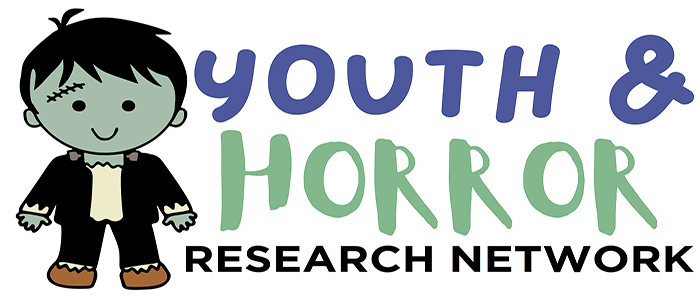Youth and Horror: An International Conference
- Location
- Alan Walters Building
- Dates
- Tuesday 1 July (00:00) - Wednesday 2 July 2025 (00:00)

The Youth and Horror Research Network international conference will take place in person on 1-2 July 2025, at the University of Birmingham, UK.
A collaboration between the University of Birmingham and Northumbria University, the Youth and Horror Research Network is an AHRC-funded, interdisciplinary, international network of scholars, educators and cultural partners, which aims to investigate and impact scholarly and public understandings of the relationship between children, youth and the horror genre. The relationship between children and horror has persisted throughout the history of youth culture, from fairy tales and nursery rhymes to the ongoing popularity of Halloween and transmedia franchises like Doctor Who, Goosebumps and Stranger Things. For today’s youth, who are growing up in an age characterised by anxiety and instability, horror has the potential to help them understand the world around them, other people, and themselves. However, the meeting of young people and horror consistently attracts controversy due to unsupported perceptions that the genre is a harmful influence upon children and young people, echoed by an emphasis in scholarly research on ‘negative’ media effects.
The Youth and Horror Research Network therefore aims to encourage renewed scholarly consideration of the benefits, pleasures and risks of youthful interactions with horror, building on foundational work in this area (e.g. Martin Barker, David Buckingham, Kate Egan) and recent contributions to the field (e.g. Filipa Antunes, Sarah Cleary, Catherine Lester).
This conference is partially funded by the Arts and Humanities Research Council and the Society for Animation Studies.
Registration
Registration is now open via the button at the top right of this webpage. Our fee structure is as below:
- Standard fee £120
- PGR fee £70
Programme
DAY 1: Tuesday 1 July
08.30-9.00 - Registration and coffee
9.00-9.20: Welcome and Reflection on the Youth & Horror Research Network
Cat Lester (University of Birmingham) & Kate Egan (Northumbria University)
9.20-10.30: Keynote - Jessica Balanzategui (RMIT, Australia) - 'What is children's horror now?: From the children's horror film to the horrors of children's cultures in the transgenerational media industries
10.30-10.50: Coffee break
10.50-12.10: Panel 1 - Folklore Legends and Cautionary Tales
Chisom Mary Adigwe (CLMCE) - African Cosmology and Spirituality: Reimaging Horror in Indigenous African Children /Young Adult Oral Literatures
Filipa Antunes (University of East Anglia) - “Don’t Let Your Parents Watch It Alone!”: Cautionary Tales and Family Horror in R. L. Stine’s The Haunting Hour
Magdalena Kempna-Pieniążek (University of Silesia in Katowice) - Between children's literature and horror films: The phenomenon of The Merry Devil's Friend series in Polish popular cinema
12.10-13.10: Lunch
13.10-14.30: Panel 2 - Adolescence and Coming-of-Age
Michael Brodski (University of Mainz) - Childhood and Youth Horror Tropes in Films of the Late Stagnation Period and Perestroika in the Soviet Union
Brogan Ord-Staunton (Northumbria University) - Menstruation, Monstrosity, and Adolescence: Exploring the Emotional Aesthetics of Horror in Turning Red
Lindsey Scott (University of Suffolk) - Becoming a Nightshade: Healing Horror in Netflix’s Wednesday
14.30-15.00: Coffee break
15.00-16.20: Panel 3 - Interactive and Immersive Storytelling
Clara de Moreas (CLMCE) - "The Shadows Took Over Everything": How ‘The Dark’ Constructs Fear for Young Readers
Dea Rezki Gerastri (CLMCE) - Swipe to Fear: the role of hidden gutters in adapting horror for young audiences in #tahilalattruestory on Instagram
Katariina Henttonen (University of Jyväskylä) - Finnish Adolescents’ Experiences of Scary Music
16.20-16.30: Comfort break
16.30-17.50: Panel 4 - The Social Benefits of Horror
Marcella Rees-Gray (independent) - Growing Up Wild: Interpreting children’s horror and its ability to unmask the neurodivergent childhood experience
Vaishnavi Saritha (independent) - Horror as Power in Children: The Subversive Transformation of Identity and Inclusivity in Kerala's Aitihyamala or The Garland of Legends
Suzanne van der Beek (Tilburg University) – Children's Ecohorror and the Literary Unconscious
19.30: Dinner (Indian Streatery, 21a Bennetts Hill, Birmingham B2 5QP)
DAY 2: Wednesday 2 July
8.30-9.00 Coffee
9.00-10.20: Panel 5 - Regulation
Mark McKenna (Staffordshire University) - Feckless Families and Feral Kids: Class, Culture and Distinction in Thatcher’s Britain
Pete Turner (Oxford Brookes University) - A Taxonomy of 1980s Youth Terror: Categorising Memories of Horror Through Retrospective Accounts of Age-Inappropriate Film Viewing
Ewan Kirkland (University for the Creative Arts) - Lock, Shock and Barrel on the cutting room floor: exorcising the trick or treaters of Tim Burton’s The Nightmare Before Christmas
10.20-10.40: Coffee break
10.40-12.00: Panel 6 - Creative Methodologies
Bethany Rose Lamont (Bath Spa University) - Making Monsters: How can creative research methods help us understand audience engagements with children's media cultures?
Nadia Di Leo (University of Foggia) - Fear frames: catharsis through horror manga and anime
12.00-13.00: Lunch
13.00-14.20: Panel 7 - Gender and Sexuality
Mars Nicoli (Sheffield Hallam University) - “I’ve always wanted a little girl”: a thematic network analysis of transgender children in horror cinema
Abby Hilton (Northumbria University) - ‘Remember the Dead’: South Korean Horror, Girlhood, and Queerness in Memento Mori (1999)
Sietse Hagen (University of Liverpool) - Trauma Ghosts in Indian Children’s Literature – Faces in the Water and City of Ghosts
14.20-14.40: Coffee break
14.40-16.00: Panel 8 - Gore and Aesthetics
Merinda Staubli (independent) - Frightening Fun: Horror as Children’s Culture
Reece Goodall (University of Warwick) - We interrupt this programme to bring you… uncanny animation and horror intertexts in Courage the Cowardly Dog
Shellie McMurdo (University of Hertfordshire) - Go(re) Go(re) Girls: Reassessing the presumed readership of Fangoria magazine within the 1980s
16.00-16.10: Comfort break
16.10-17.30: Panel 9 - Disney’s ‘Dark Ages’
Simon Brown (independent) - Disney Goes to Hell: Dark Matter in The Black Hole (1979)
Stacey Abbott (Northumbria University) - The Dark Art of Disney: A Deep Dive into The Black Cauldron
Karolina Kostyra (University of Silesia in Katowice) - Who's afraid of children's horror? On the reception of Return to Oz
17.30-17.40: Closing remarks
17.40: Conference ends
Call for papers - now passed
We invited submissions for 20-minute papers on topics examining the intersections of horror, youth and childhood, with an inclusive and flexible approach to how any of these terms may be defined, and in relation to a broad range of media (including film, television, video games, online cultures, literature, comics, toys etc.). Papers may include:
- Interpretations and/or histories of horror texts addressed to children, or other horror texts which are encountered in youth;
- Intersectional approaches to the relationship between youth, horror, identity and/or monstrosity, e.g. race, gender, sexuality, disability, class;
- International perspectives on youth and horror, especially outside of the UK and the US;
- New reflections on media debates and moral panics about youth and horror, e.g. the 1950s Horror Comics Campaign, the 1980s ‘Video Nasty’ scandal, the 1980s Satanic Panic;
- Attitudes of censors and regulators to the issue of youth and horror (including parents as regulators, children as self-regulators, as well as official bodies e.g. BBFC, MPA, Ofcom, local councils);
- Children's/young people’s fandom of horror, or adult fandom/nostalgia of childhood horror texts;
- Definitions and boundaries of genres, tastes and audiences, and how these are affected by the meeting of youth and horror;
- Cross-media adaptations of texts relating to young people and horror;
- Aesthetics and modes of horror for young people (including, for instance, animation);
- Theoretical approaches to youth and horror, e.g. cognitive, phenomenological/affective, psychoanalytic, behavioural/developmental;
- Archival and memory research on young people’s encounters with horror;
- The roles and uses of horror in education and wellbeing e.g. mental health;
- The role of horror in childhood play;
- Climate crisis as horror and its relationship to youth;
- Horror-related distribution, broadcasting and marketing for children and young people;
- Practice-as-research approaches to youth and horror.
Getting to the University of Birmingham
The University of Birmingham is situated in Edgbaston, just three miles from Birmingham city centre. It is well served by public transport services, including its on train station.
Find out more about travelling to the University by public transport, bicycle, car, or air.
Venue
The conference will take place in our Alan Walters Building from Tuesday July 1st - Wednesday July 2nd, R29 on our campus map in the red zone. You can find details via our online and downloadable maps of the campus.
Accessibility
Information about building accessibility for the Arts building is available on our AccessAble guide.
If you cannot find the information you need or have other access requirements or need reasonable accommodations, please get in touch with the conference organisers at m.clulee@bham.ac.uk
Accommodation
Please see the Visit Birmingham website to explore accommodation options across the city. Trains from Birmingham New Street station in the city centre run regularly to our university train station, taking around 7 minutes. Taxis from the city centre to main campus would take around 15-20 minutes dependent on traffic.
The University does have a hotel on campus Edgbaston Park Hotel and Conference Centre. It is likely to be booked for our conference dates, but if you wanted to see if there were any places available please contact reservations@edgbastonparkhotel.com or call +44 (0)121 414 8888 for best rates.
About the organisers
Dr Catherine Lester is Associate Professor of Film and Television at the University of Birmingham, and Principal Investigator of the Youth & Horror Research Network. Her research centres on the intersections between children’s culture, the horror genre and cult media with a particular focus on horror films and television made for children in Britain and the US. Her key publications in this area include the monograph Horror Films for Children: Fear and Pleasure in American Cinema (Bloomsbury 2021) and the edited collection Watership Down: Perspectives On and Beyond Animated Violence (Bloomsbury 2023).
Dr Kate Egan is Assistant Professor in Film and Media at Northumbria University, and Co-Investigator of the Youth & Horror Research Network. She is the author of Trash or Treasure? Censorship and the Changing Meanings of the Video Nasties (MUP, 2007), Cultographies: The Evil Dead (Wallflower, 2011), and (with Martin Barker, Tom Philips and Sarah Ralph) Alien Audiences (Palgrave Macmillan, 2016), and she is co-editor of the Hidden Horror Histories book series (LUP). She is currently developing further research on audience memories of horror film and television. This includes a monograph, Remembering Ghostwatch: Horror, Childhood and the Home, and an edited collection, Researching Horror Fans and Audiences in the Twenty-First Century, with James Rendell (University of South Wales).
